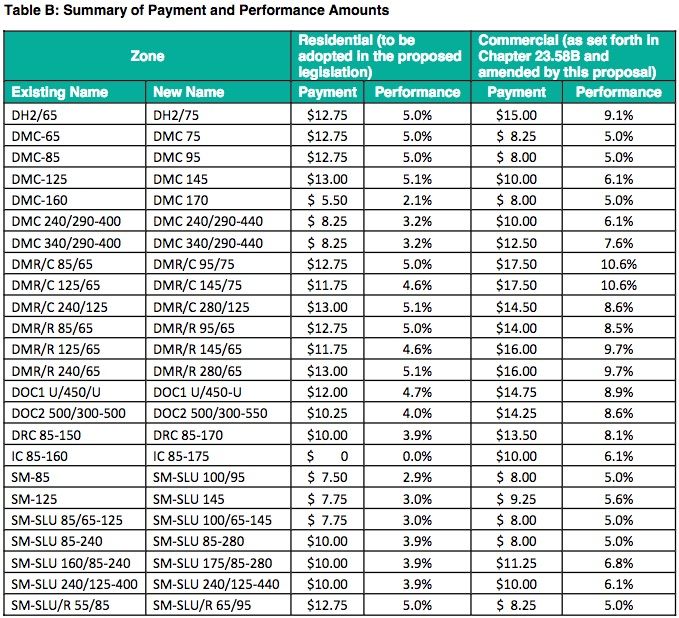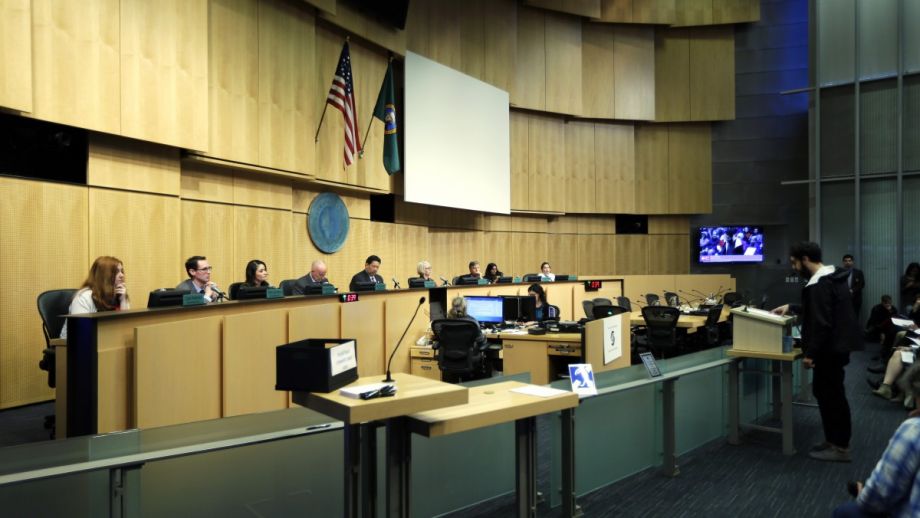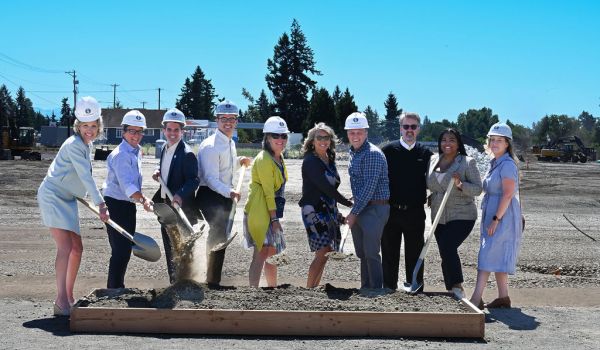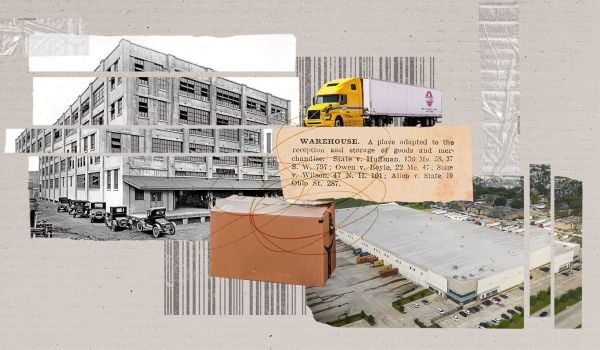On Monday, the Seattle City Council unanimously passed a bill to upzone most of the downtown and South Lake Union neighborhoods. In exchange for the extra height and floor area, residential and commercial developers will be required to either include rent-restricted affordable housing in their buildings or pay an in lieu fee into the city housing fund. The upzone is part of the city’s Housing Affordability and Livability Agenda, which includes plans for citywide upzones with affordability requirements.
Though the upzone bill passed unanimously, there was tension on the council over whether the city was asking enough from downtown developers. Council Member Lisa Herbold introduced an amendment to increase the developer performance and fee requirements in the Mandatory Housing Affordability-Residential (MHA-R) program, arguing that the city was leaving money on the table for no good reason. Council Member Rob Johnson, chair of the Planning, Land Use and Zoning Committee, countered that altering affordability requirements, especially at the 11th hour, could scare off developers, resulting in less affordable housing built in the end. It’s a critical debate for any city experimenting with inclusionary zoning programs: How much money and housing can you require of developers before you undermine your goal by stymieing new construction?
South Lake Union and downtown have 24 zones. The bill modifies each zone, allowing a 10-foot height increase on the low end and as much as 50 extra feet on the high end for residential towers. The requirements vary as well, from residential developers offering just 2.1 percent of their total units as rent-restricted affordable housing or paying an in lieu fee of $5.50 per square foot up to a 5.1 percent performance requirement and $13 per square foot in lieu fee. Commercial developers also have a range of fees and requirements that top out at 10.6 percent performance and a $17.50 per square foot fee.
The city expects downtown and South Lake Union development to produce 2,100 rent-restricted units over the next decade through MHA. That’s more than a third of the 6,000 rent-restricted units they hope the program will produce citywide.
The performance and fee structure come from the HALA Committee’s so-called “Grand Bargain.” Made up of developers, city staff, nonprofit housing providers and other interested parties, the committee spent many months debating policy proscriptions to alleviate Seattle’s affordability crisis. Because the MHA requirements came out of that bargain, some council members, including Johnson, worry that raising the fees could disincentivize development, lead to lawsuits from developers and result in less affordable housing overall.
“Even within the Grand Bargain it says it’s understood that, in the course of implementation, terms might change,” said Herbold at Monday’s council meeting.
Her amendment would have called for residential developers to make affordable housing units 5 percent of a build or pay a $14.75 per square foot in lieu fee. The higher requirements would result in as much as 450 extra affordable units getting built, or an extra $1.3 million to $1.9 million each year from in lieu fees.


From a city of Seattle report on the Downtown/South Lake Union upzone
Herbold explained her goal was to have consistent policy approach across the city (the low end of the requirements is lower than other neighborhood upzones) and to “realize modest increase in payments for affordable housing.”
But Johnson pushed back. “I am going to ask my colleagues to vote against [Herbold’s amendment] for a couple of reasons. I think we have an obligation as set up in framework to meet that goal of 6,000 units of affordable housing. … I don’t think we have the time and energy to analyze the impact a 5 percent requirement would have on number of units built.”
Johnson also said he hopes the low incentive fee and performance requirement would encourage the 40 or so downtown projects already in the pipeline that wouldn’t be subject to the new requirements to voluntarily opt in, in exchange for the extra height or floor area.
The amendment failed 7 to 2 with just Council Member Kshama Sawant joining Herbold in voting yes.
In her supporting comments, Sawant said, “We live in a region where two of the richest people in the world live side by side with thousands of people who have no housing at all. It would be farcical if it were not such a tragedy. … In a neighborhood where housing developers are making the most profit, where affordable housing is becoming an endangered species, developers will be required to build less affordable housing than anywhere else in the city.”
Beyond the MHA requirements asking less of downtown developers than elsewhere in the city, it appears perhaps that Seattle is asking less of them than any other city with an incentive zoning program.
“This is the lowest affordability expectation of anywhere in the country. Generally, the lowest you encounter is 5 percent,” says Robert Hickey, a housing policy consultant who specializes in incentive zoning.
He says cities do sometimes lower requirements for downtown developers because housing must compete with commercial developers. Johnson, in fact, cited that as a reason for the lower percentages and in lieu fees.
“This sounds to me a policy that’s not really asking developers or land owners to stretch too far to make affordable housing work,” Hickey says. “It’s a very cautious approach. I’m not the judge of whether that’s the right or wrong approach for this city.”
Though the upzone and MHA-R program will move forward in downtown and South Lake Union without Herbold’s amendments, the city is required to revisit the issue in June 2018 and make revisions if they feel they’re necessary.

Josh Cohen is Crosscut’s city reporter covering Seattle government, politics and the issues that shape life in the city.
Follow Josh .(JavaScript must be enabled to view this email address)
















